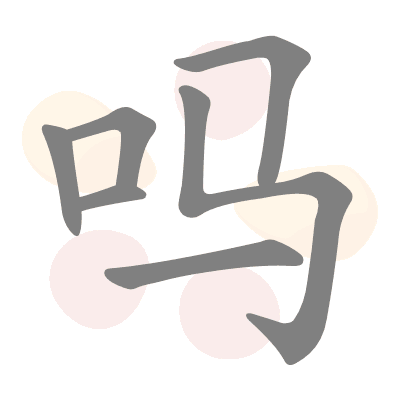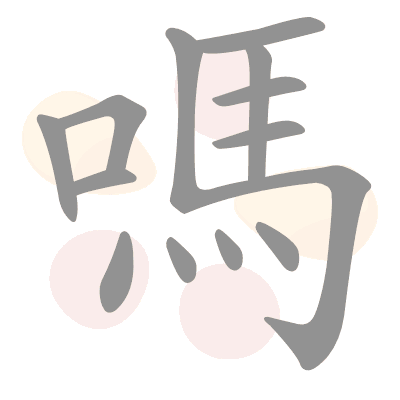吗
嗎
par. used at the end of a question or a rhetorical question; used within a sentence to mark a pause
| 80% | 120% |
Register to get less ads.
Registration is free and once you are registered you use this word in your private vocabulary lists.
Then you can train your own vocabulary either here or using one of our applications for PC, iOS or Android.
Registration is free and once you are registered you use this word in your private vocabulary lists.
Then you can train your own vocabulary either here or using one of our applications for PC, iOS or Android.
Other meanings
| char. (not alone; used in the transliteration) drug name (e.g. morphine) |
|
| pro. (dialect) what |
|
Simplified Chinese Traditional Chinese |
Simplified stroke orders are based on the 'Standard of National Commonly-used Mandarin Chinese Characters (现代汉语通用字笔顺规范)', issued by the China National Language and Character Working Committee (国家语言文字工作委员会) on April 7th 1997. Traditional stroke orders are based on information issued by the Taiwan Ministry of Education.
你 你 phr. Do you like it? |
还 還 phr. Have you got any other ones? |
忙 忙 phr. (Are you) busy? |
吃 吃 phr. Are you full? |
是 是 phr. Is that so? Really? |
真 真 phr. Really? Is it true? |
你 你 phr. Do you speak Chinese? |
你 你 phr. Are you busy? |
你 你 phr. Are you tired? |
还 還 phr. Still want more? Still want (it)? |
你 你 phr. Are you crazy? Are you out of your mind? |
你 你 phr. Did you fall sick? |
好 好 phr. Is it tasty?; Is it delicious? |
你 你 phr. Do you dare to ride horses? |
你 你 phr. Are you married? |
有 有 phr. Is there anything (to do)? |
懂 懂 phr. Understood? Got it? |









